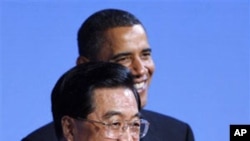The White House says China must take more steps to allow its yuan currency to strengthen, and says that view is shared by many countries around the world.
Spokesman Robert Gibbs spoke Tuesday, hours before Chinese President Hu Jintao was to arrive in Washington for a state visit aimed at easing tensions between the world's two greatest economic powers.
Mr. Hu and President Barack Obama are also expected to discuss human rights, protections for intellectual property, energy, China's military buildup and multi-lateral tensions with North Korea.
|
Hu Jintao's Schedule in Washington |
Beijing has already announced $600 million in trade deals with American companies this week, and others are possible. But with China's annual surplus in trade with the United States running at more than $200 billion, some blunt discussions about economic differences are likely.
On Monday, three lawmakers from Mr. Obama's Democratic Party introduced legislation to pressure China to let its currency appreciate more rapidly. The legislation comes as U.S. lawmakers and economic analysts argue that China is manipulating its currency to keep it undervalued. Some analysts say the huge U.S. trade deficit could drop significantly if China let the yuan rise in value by 20 percent over the next three years.
In a pre-visit interview with two American newspapers, Mr. Hu avoided questions about human rights, but the issue could come up at a joint news conference Wednesday.
Both governments have stressed in recent days their desire to avoid confrontation as China rapidly increases its economic and military power.
Mr. Hu said in his interview with the Washington Post and Wall Street Journal that the two countries should seek common ground on a range of issues and "abandon the zero-sum Cold War mentality" in which one country's gain is another country's loss. He said both countries stand to gain from a sound relationship "and lose from confrontation."
U.S. Secretary of State Hillary Clinton said last week that the United States does not view China's rise as a threat and is not interested in constraining its growth.




